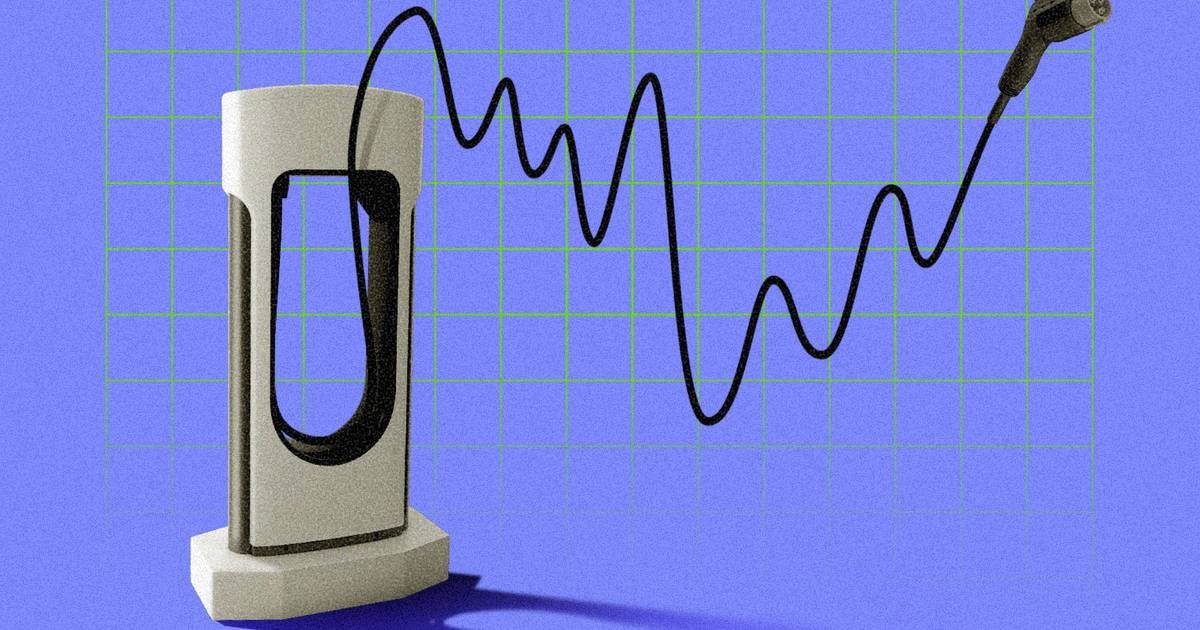Marcus Long has spent his entire career in the automotive space. Like the industry, the 31-year-old Detroiter is adapting to the electric age.
Long recently graduated from the inaugural cohort of a program aimed at training workers for a job that’s expected to be in high demand as EV adoption increases: an electric vehicle supply equipment, or EVSE, technician.
The free, 120-hour program, based at Detroit’s Michigan Central tech hub, prepares participants for a certification exam that is slated to roll out nationwide next month—and for jobs installing charging stations and performing diagnostics, maintenance, and repair work. It’s a partnership between SAE International, charging station maintenance provider ChargerHelp, the city of Detroit, and others.
The initiative complements other efforts to establish a skilled EV-sector workforce, all in service of a broader mission: building out a reliable, widely accessible EV charging network as millions more EVs are slated to be on the road in the years to come.
The Biden administration is pushing for some 500,000 chargers to be up and running by 2030. The US had around 130,000 public charging stations as of last spring; but thousands at a time are regularly out of service, underscoring the need for having more workers available to fix them. As such, electricians are expected to be in high demand in the EV sector, and major industry players are investing in workforce development initiatives to address the urgent need for more workers.
Long, who drives a plug-in car himself, is eager to put his newly acquired skills to work. He plans to take the certification exam “as soon as it comes out” and then look for work as a technician, hopefully at a starting wage of at least $30 per hour.
Working as a technician is “what I want to do,” he told Tech Brew. “I want to dive deep into the field, because I have a passion for automotive…I want to dive even deeper and see how far I can go.”
“Huge need”
The EV charging sector has a “huge need” for workers with the skills to install and fix chargers, Rick Wilmer, president and CEO of EV charging company ChargePoint, told us.
“Training the world’s population of electricians and technicians to work effectively with EVSE is a critical need in the industry,” he said.
ChargePoint plans to debut a digital curriculum for these skills later this year and then offer an exam that will “allow electricians and technicians…to be certified on ChargePoint equipment.”
Wilmer said he is happy to see other stakeholders working on the same thing: “If we tried to do this all by ourselves with online courses or a handful of instructors that ran around the country and held classes, we wouldn’t reach enough technicians and electricians quickly enough.”
Keep up with the innovative tech transforming business
Tech Brew keeps business leaders up-to-date on the latest innovations, automation advances, policy shifts, and more, so they can make informed decisions about tech.
SAE projects that some 10,000 EVSE technicians will be needed in the next five years, Michael Paras, senior manager of business development, partnerships, product, and sales at SAE, told us.
“We’re…going through the biggest transition in automotive technology in 100 years,” he said. “That means people have an opportunity to join an industry and a phenomenon that is nothing but opportunity.”
Making charging more reliable
SAE, a technical organization for engineers, helps establish standards for the sectors it serves. One emerging area of focus is “finding ways to help educate, train, and certify the people who are going to take part in this energy transition,” Frank Menchaca, president of SAE’s Sustainable Mobility Solutions group, told Tech Brew. These jobs are “emerging very, very rapidly. And the way that people get there may not be the traditional four-year college degree.”
The EVSE training program is one prong of this effort. Starting next month, SAE’s accreditation affiliate will begin administering a certification exam across the country that will give workers credentials to help them get jobs doing things like troubleshooting software issues, repairing faulty equipment, and diagnosing charging problems. Menchaca estimated such roles could command starting salaries of $70,000 to $80,000 per year—a potentially appealing proposition for workers looking to break into the EV industry.
Menchaca views the skills acquired in such programs as ones that workers can build upon to pursue even better jobs in the clean energy sector as it grows.
“This is an industry…that is likely to keep expanding,” he said. “If you’re able to upskill yourself, there’s probably multiple pathways that you can take to continually better-paying jobs and a career ladder, frankly.”
Ultimately, the goal of these efforts is to support EV adoption. The lack of reliable public charging infrastructure in the US is one reason the transition has been bumpy of late, as consumers report frustrating experiences plugging in on-the-go and concerns about access to charging.
EVSE certification is “one node in a whole network of activities that are focused on helping to benchmark and improve reliability,” Menchaca said. “We’re at a very nascent stage in this infrastructure. And hopefully, over time, it becomes as widespread and dependable as the way you fill your gas tank now.”
[ad_2]
Source link




